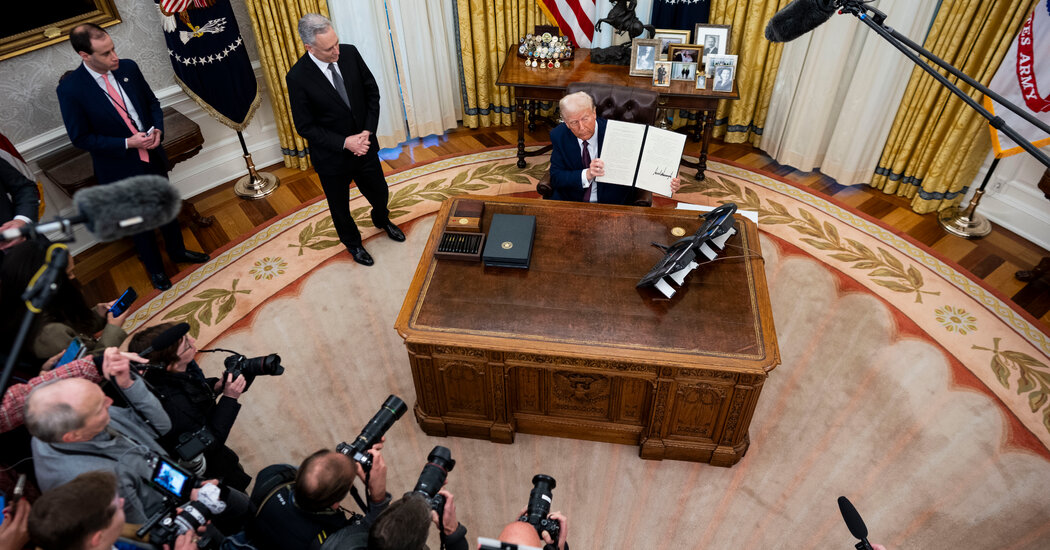Thirty years ago, Congress considered a bill much like President Trump’s recent executive order on birthright citizenship. It sought to deny automatic citizenship to children born in the United States to parents who were not legal residents. Such bills have been introduced from time to time, and they have never gone anywhere.
The Citizenship Reform Act of 1995 was notable mostly because it provoked a remarkable statement on the deeper meaning of birthright citizenship from one of the witnesses who testified against the bill, a lawyer named Walter Dellinger. A constitutional scholar then in charge of the Office of Legal Counsel, the elite unit of the Justice Department that advises the executive branch on the law, Mr. Dellinger first addressed a question he thought barely worth discussing.
“My office grapples with many difficult and close issues of constitutional law,” he said. “The lawfulness of this bill is not among them. This legislation is unquestionably unconstitutional.”
That statement anticipated one on Thursday from Judge John C. Coughenour of the Federal District Court in Seattle. At a hearing before issuing a temporary restraining order blocking Mr. Trump’s order, Judge Coughenour said: “I’ve been on the bench for over four decades. I can’t remember another case where the question presented is as clear as this one. This is a blatantly unconstitutional order.”
If birthright citizenship is to be revoked, Mr. Dellinger said in 1995, it will require a constitutional amendment. That led to his larger point, which was that changing the rules would be a catastrophic betrayal of American values forged in the Civil War.
“To adopt such an amendment would not be technically unlawful,” he said, “but it would flatly contradict our constitutional history and our constitutional traditions.”
The idea that children born in the United States automatically become citizens of the United States has deep roots in the common law. But it was not adopted in the constitutional text until 1868, in the first sentence of the 14th Amendment: “All persons born or naturalized in the United States, and subject to the jurisdiction thereof, are citizens of the United States and of the state wherein they reside.”
That sentence overturned Dred Scott, the 1857 Supreme Court decision that affirmed slavery and helped prompt the Civil War.
That history has heft, said Mr. Dellinger, who died in 2022 after a long career in the government and the legal academy and as a leading member of the Supreme Court bar.
“In its most monumentally erroneous decision, the Supreme Court created a monstrous exception to the common law rule that birth on American soil to a free person was sufficient for American citizenship,” he said. “The court held that no persons of African descent — including free persons of African descent — and none of their descendants for all time to come could ever be citizens of the United States regardless of their birth in America.”
“From our experience with Dred Scott,” Mr. Dellinger added, “we had learned that our country should never again trust to judges or politicians the power to deprive from a class born on our soil the right of citizenship.”
The Dred Scott decision helped lead to the rise of the Republican Party and one of the ruling’s most bitter critics, Abraham Lincoln.
The right should embrace that legacy, John Yoo, a law professor at the University of California, Berkeley, and a former official in the George W. Bush administration, wrote in 2018, after Mr. Trump first started talking about his opposition to birthright citizenship.
“Conservatives should reject Trump’s nativist siren song,” he wrote, “and reaffirm the law and policy of one of the Republican Party’s greatest achievements: the 14th Amendment.”
Mr. Trump and his allies focus on a phrase in the 14th Amendment that limits birthright citizenship to those “subject to the jurisdiction” of the United States.
That phrase has a straightforward meaning, James C. Ho, a lawyer who later became a federal judge, wrote in a careful and thorough 2016 article in The Green Bag, a legal journal.
“It excludes those persons who, for some reason, are immune from, and thus not required to obey, U.S. law,” he wrote. “Most notably, foreign diplomats and enemy soldiers — as agents of a foreign sovereign — are not subject to U.S. law, notwithstanding their presence within U.S. territory.”
Aside from those narrow exceptions, he wrote, birthright citizenship “is protected no less for children of undocumented persons than for descendants of Mayflower passengers.”
Judge Ho, who sits on the U.S. Court of Appeals for the Fifth Circuit and has been mentioned as a candidate for the Supreme Court, seemed to recede from that broad view in an interview in November.
“Birthright citizenship obviously doesn’t apply in case of war or invasion,” he told Josh Blackman, a conservative law professor (and a supporter of birthright citizenship). “No one to my knowledge has ever argued that the children of invading aliens are entitled to birthright citizenship. And I can’t imagine what the legal argument for that would be.”
Whatever Judge Ho’s current position, the conclusion of his 2016 article may turn out to be prescient.
“Stay tuned,” he wrote. “Dred Scott II could be coming soon to a federal court near you.”
United States Politics and Government,Citizenship and Naturalization,Decisions and Verdicts,Conservatism (US Politics),Fourteenth Amendment (US Constitution),Presidential Election of 2024,Executive Orders and Memorandums,Constitution (US),Supreme Court (US),Republican Party,Trump, Donald J,Dellinger, Walter E,Coughenour, John,Scott, Dred
#Trumps #Plan #Birthright #Citizenship #Dred #Scott



